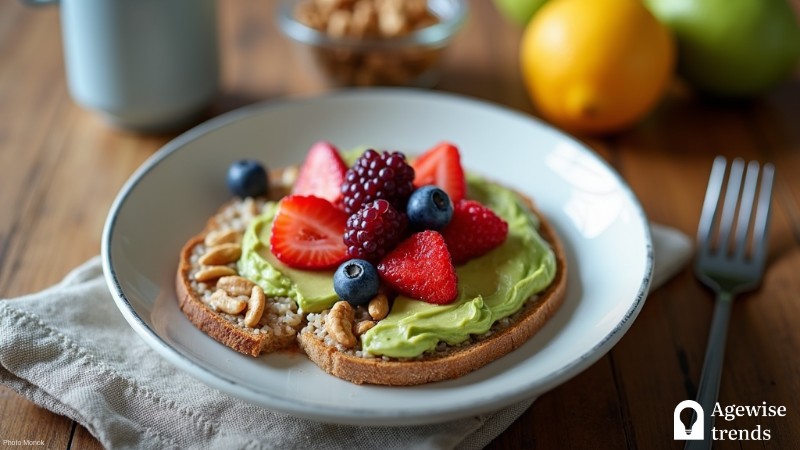Starting the day with a well-balanced breakfast can make a significant difference in managing blood sugar levels for seniors. Many traditional breakfast options, such as sugary cereals, white bread, and processed pastries, can cause sharp glucose spikes, leading to fatigue and hunger soon after eating.
Choosing nutrient-dense meals with the right combination of fiber, protein, and healthy fats can help stabilize blood sugar and promote overall well-being.
Key Takeaways
Seniors with diabetes can manage their blood sugar levels effectively by choosing nutritious breakfast options rich in fiber, protein, and healthy fats.
- Natural sweeteners like cinnamon and fruits high in fiber are better alternatives for those who enjoy a touch of sweetness.
- Nutrient-dense meals such as spinach and mushroom omelets, oatmeal with chia seeds and walnuts, and Greek yogurt parfaits provide balanced nutrition.
- Maintaining a structured eating schedule and practicing mindful eating habits help stabilize blood sugar levels throughout the day.
Rethinking sweetness
Sweet flavors don’t have to come from refined sugar. For those who enjoy a touch of sweetness in the morning, natural alternatives can provide flavor without causing significant blood sugar spikes. Cinnamon, for example, is a great way to spice up a simple meal while helping improve insulin sensitivity. Vanilla extract enhances smoothies and overnight oats without adding sugar.
Fruits like berries, pears, and apples contain natural sugars but are also packed with fiber, which slows digestion and prevents rapid glucose absorption. By shifting the focus from processed sugars to naturally occurring flavors, it’s possible to enjoy sweet breakfasts in a way that supports diabetes management.
Satisfying and nourishing breakfast recipes
A spinach and mushroom omelet is a great way to start the day with a nutrient-dense meal. Cooking sliced mushrooms in olive oil until tender enhances their earthy flavor, while fresh spinach adds fiber and essential vitamins.
Beaten eggs create a creamy, protein-packed base that binds everything together. A sprinkle of black pepper and a pinch of salt bring out the natural flavors, making this dish both simple and delicious. Pairing the omelet with a slice of whole-grain toast provides additional fiber, which further supports blood sugar stability.
For those who prefer a warm and comforting breakfast, cinnamon-spiced oatmeal with chia seeds and walnuts is a fantastic choice. Steel-cut or rolled oats, cooked in unsweetened almond milk, offer a hearty base that is naturally rich in fiber.
Stirring in chia seeds boosts omega-3 fatty acids, while walnuts provide a satisfying crunch. A few slices of apple or a handful of fresh berries add natural sweetness and antioxidants, making this meal both nourishing and flavorful.
Greek yogurt parfait with flaxseeds, almonds, and fresh berries is another excellent breakfast option. Thick, unsweetened Greek yogurt serves as a creamy and protein-rich base, supporting digestion and muscle health. Flaxseeds contribute fiber and essential fatty acids, while toasted almonds add a nutty crunch.
A medley of blueberries, raspberries, and strawberries not only enhances the flavor but also provides antioxidants that help combat inflammation. Drizzling a small amount of unsweetened coconut milk on top ties the ingredients together, creating a well-balanced and satisfying meal.
Creating a long-term healthy eating plan
Beyond just choosing the right foods, maintaining a structured eating schedule helps stabilize blood sugar throughout the day. Skipping breakfast or opting for highly processed options can lead to erratic glucose levels, energy crashes, and increased cravings for unhealthy snacks.
Mindful eating habits also make a difference. Eating slowly and savoring each bite allows the body to properly digest food and recognize satiety cues. This is particularly important for seniors managing diabetes, as rushed meals can lead to overeating or poor food choices later in the day.
Consulting with a healthcare provider or a registered dietitian can further personalize meal plans to fit individual health needs. While general dietary guidelines are helpful, every person’s body responds differently to food. Adjustments based on medical history, physical activity levels, and other health conditions can ensure that breakfast remains both enjoyable and beneficial.
Focusing on whole, natural ingredients, and staying mindful about nutrition can make breakfast a powerful tool for managing diabetes. By embracing a balanced and sustainable approach, seniors can enjoy a variety of delicious, health-supportive meals that contribute to long-term well-being.














